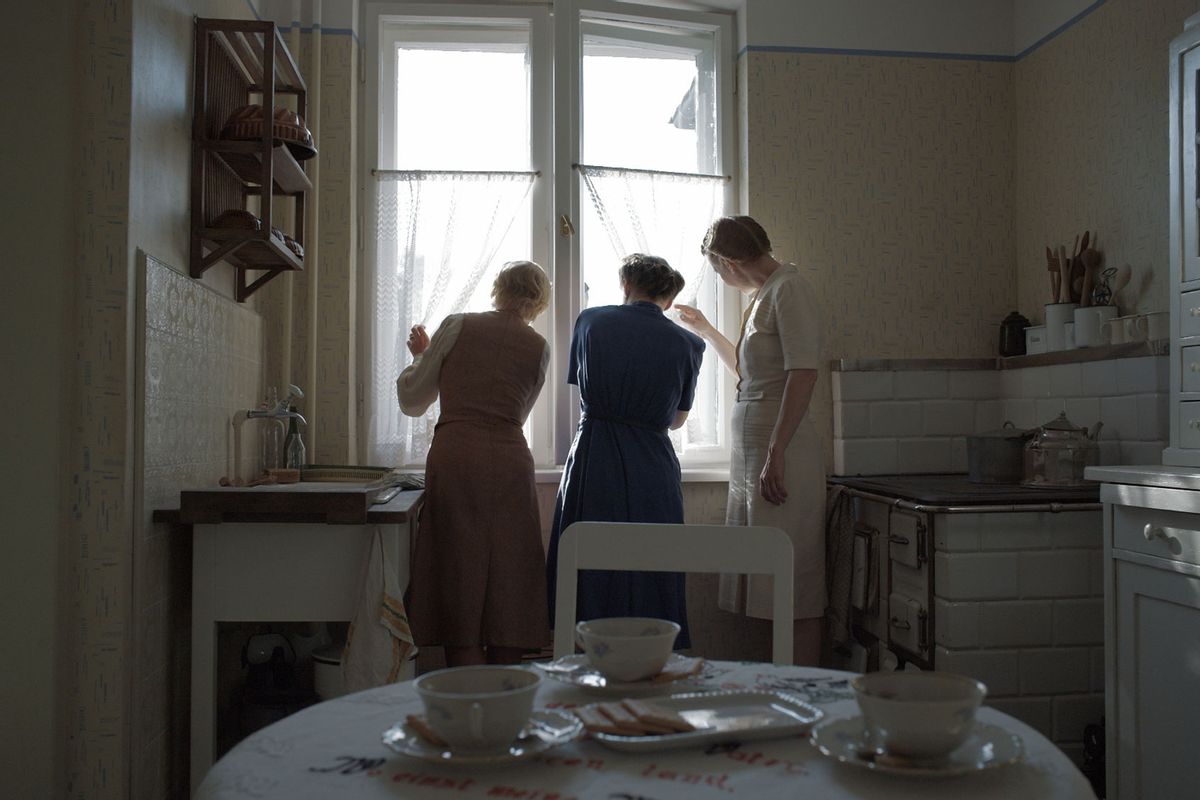- About Holocaust deniers;
- About measles deniers;
- About denial of sociology;
- About the appeal of extinction panic.

Salon, Gary M. Kramer, 25 Jan 2024: “There will always be Holocaust deniers”: How “Zone of Interest” reveals unsettling truths about us, subtitled “The Oscar-nominated Johnnie Burn spoke to Salon about producing the sounds from the death camp next door”
This concerns a 2023 film I haven’t seen yet, though since it’s up for a bunch of Oscars, I might yet see it.
I’m mentioning it to make a broader point.
There are always people who deny, or minimize, historical events that put their own tribe/culture/nation in a bad light. It’s never about academic disputes over the factuality of history; it’s about maintaining the good reputation of their tribe/culture/nation. (Of course in the case of the Holocaust, it’s also deeply connected to conspiracy theories about the Jews running the world.)
Related is this:

Salon, Nicole Karlis, 25 Jan 2024: How “The Brady Bunch” facilitates misplaced nostalgia about measles on social media, subtitled “Collective amnesia about a time when measles was endemic is a ‘luxury’ for high income countries”
A popular ’70s-era sitcom is once again being used to promote vaccine misinformation. On Instagram, a momfluencer known for promoting “medical freedom” shared a clip from an episode of “The Brady Bunch” called “Is There a Doctor in the House?” which features the entire family getting sick with measles. First, Peter is sent home from school with a 101.1º fever and a case of the viral disease. Carol Brady, describes his symptoms as “a slight temperature, a lot of dots and a great big smile” because that means no school for a few days. Next, Jan comes down with the measles. Then, all of the siblings develop a case of the measles.
The momfluencer says she grew up during “The Brady Bunch era,” which is “before the propaganda really set it.” She asks: What made measles go from this to the “panic” people experience today?
Some followers respond with a tone of nostalgia, yearning for “the good old days,” while others say “natural immunity is best.” This post is far from the first of its kind to use the episode as an opportunity to rally people against the measles, mumps and rubella (MMR) vaccines.
The article goes on with details about the current, expanding measles epidemic. This is, to me, yet another example of modern people, the beneficiaries of centuries of increased medical knowledge, that has greatly improved the health and lifespans of millions of people, perversely rejecting such knowledge for one reason or another. Inconvenience? Deference to religious texts? Community group think in rejecting the thinking of coastal elites?
And so, as in the Holocaust denial story, retelling the past to avoid modern truths. (As in the downplaying Southern rejection of slavery.)
\\\
One way they do this is to dismiss subjects that challenge their prejudices and religious conceits as being “woke.” Entire subjects.

The Messenger, 26 Jan 2024: Ron DeSantis Crew Stomps Out Sociology Core Class in Florida Public Universities, subtitled “Students should be focused on learning the ‘truth,’ rather than be ‘radicalized by woke ideologies in the college classrooms,’ said education commissioner” (via)
Which is to say, Florida wants to impose its own ideology over the one it perceives in university courses. One in which America has always been great and slavery was excusable.
\\\
In my current thesis-space these are yet more examples of the narrative-bias in human psychology, the need for humans to sort out events in terms of stories that need to conform with their community beliefs. Of course this casts skepticism over the entire enterprise of history; told by the winners is just the surface of it.
\\\
I have time for one more piece today, which can also be seen in support of this thesis. A long opinion article in today’s Sunday NYT, posted online two days ago.

NY Times, Tyler Austin Harper, 26 Jan 2024: The 100-Year Extinction Panic Is Back, Right on Schedule
The point here is “right on schedule.”
In a certain sense, none of this is new. Apocalyptic anxieties are a mainstay of human culture. But they are not a constant. In response to rapid changes in science, technology and geopolitics, they tend to spike into brief but intense extinction panics — periods of acute pessimism about humanity’s future — before quieting again as those developments are metabolized. These days, it can feel as though the existential challenges humanity faces are unprecedented. But a major extinction panic happened 100 years ago, and the similarities are unnerving.
The writer describes the situation in 1920. And evokes an eternal in human nature.
What makes an extinction panic a panic is the conviction that humanity is flawed and beyond redemption, destined to die at its own hand, the tragic hero of a terrestrial pageant for whom only one final act is possible. The irony, of course, is that this cynicism — and the unfettered individualism that is its handmaiden — greases the skids to calamity. After all, why bother fighting for change or survival if you believe that self-destruction is hard-wired into humanity? What the history of prior extinction panics has to teach us is that this pessimism is both politically questionable and questionably productive. Our survival will depend on our ability to recognize and reject the nihilistic appraisals of humanity that inflect our fears for the future, both left and right.
And,
As a scholar who researches the history of Western fears about human extinction, I’m often asked how I avoid sinking into despair. My answer is always that learning about the history of extinction panics is actually liberating, even a cause for optimism. Some of these earlier panics were caused by faulty, misinterpreted or creatively applied scientific developments. New paleontological and geological theories stoked a rash of extinction discourse in early-19th-century England, for example, and experts ginned up fears of famine and population explosion in the 1960s and ’70s. Other moments of paranoia, like the various spasms of nuclear-induced distress during the Cold War, were grounded in all-too-real threats. Nearly every generation has thought its generation was to be the last, and yet the human species has persisted. As a character in Jeanette Winterson’s novel “The Stone Gods” says, “History is not a suicide note — it is a record of our survival.”
Take a deep breath.
The article goes on in a perhaps not unremarkable series of citations from works of futurism and science fiction. Winston Churchill, H.G. Wells, J.B.S. Haldane, Karel Capek. It all resembles the appeal of conspiracy theories, in that belief in them, or the end of the world, makes their adherents feel special, privileged, since they feel they’re clued in on something the rest of the populace is unaware of. Yet it happens over and over again, and never comes true. (Just like the return of Jesus.)





